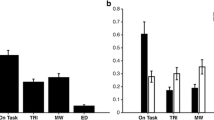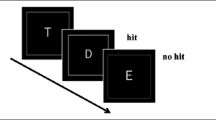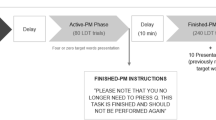Abstract
Blank in the mind (BIM) is a metacognitive experience denoting that temporarily there is no content in consciousness. The metacognitive experience of BIM occurs in cases of prospective memory failure when the intention that guided one’s action (or the cue for the initiation of action) is not maintained in memory. A study is presented in which the hypothesis was that increased working memory load will increase the prospective memory failures and metacognitive experiences such as BIM, tip-of-the-tongue, awareness of omission, and awareness of commission errors. The results suggested that working memory load differentially affected the ratings of metacognitive experiences. Moreover, there was no correlation between BIM and tip-of-the-tongue ratings. The implications of the findings for theories of prospective memory failures and metacognition are discussed.
Access this chapter
Tax calculation will be finalised at checkout
Purchases are for personal use only
Similar content being viewed by others
References
Brandimonte, M., Einstein, G. O., & McDaniel, M. A. (Eds.) (1996). Prospective memory: Theory and applications. Mahwah, NJ: Erlbaum.
Broadbent, D. E., Cooper, P. F., Fitzgerald, P., & Parkes, K. R. (1982). The cognitive failures questionnaire (CFQ) and its correlates. British Journal of Clinical Psychology, 21(1), 1–16.
Brown, R., & McNeill, D. (1966). The “tip-of-the-tongue” phenomenon. Journal of Verbal Learning and Verbal Behavior, 5, 325–337.
Chapman, J. (1966). The early symptoms of schizophrenia. British Journal of Psychiatry, 112, 225–251.
Craik, F. I. M., & Kerr, S. A. (1996). Commentary: Prospective memory, aging, and lapses of intention. In M. Brandimonte, G. O. Einstein, & M. A. McDaniel (Eds.), Prospective memory: Theory and applications (pp. 227–237). Mahwah, NJ: Erlbaum.
Einstein, G. O., & McDaniel, M. A. (2005). Prospective memory: Multiple retrieval processes. Current Directions in Psychological Science, 14(6), 286–290.
Einstein, G. O., McDaniel, M. A., Williford, C. L., Pagan, J. L., & Dismukes, R. K. (2003). Forgetting of intentions in demanding situations is rapid. Journal of Experimental Psychology: Applied, 9(3), 147–162.
Einstein, G. O., Smith, R. E., McDaniel, M. A., & Shaw, P. (1997). Aging and prospective memory: The influence of increased task demands at encoding and retrieval. Psychology and Aging, 12(3), 479–488.
Einstein, G. O., Thomas, R., Mayfield, S., Shank, H., McDaniel, M. A., & Morrisette, N. (2005). Multiple processes in prospective memory retrieval: Factors determining monitoring versus spontaneous retrieval. Journal of Experimental Psychology: General, 134(3), 327–342.
Hicks, J. L., Marsh, R. L., & Cook, G. I. (2005). Task interference in time-based, event-based, and dual intention prospective memory conditions. Journal of Memory and Language, 53(3), 430–444.
Koriat, A. (2000). The feeling of knowing: Some metatheoretical implications for consciousness and control. Consciousness and Cognition, 9(2), 149–171.
Koriat, A., Ben-Zur, H., & Druch, A. (1991). The contextualization of input and output events in memory. Psychological Research, 53(3), 260–270.
Koriat, A., Ben-Zur, H., & Sheffer, D. (1988). Telling the same story twice: Output monitoring and age. Journal of Memory and Language, 27(1), 23–39.
Koriat, A., Pearlman-Avnion, S., & Ben-Zur, H. (1998). The subjective organization of input and output events in memory. Psychological Research, 61(4), 295–307.
Loft, S., Kearney, R., & Remington, R. (2008). Is task interference in event-based prospective memory dependent on cue presentation? Memory and Cognition, 36(1), 139–148.
Marsh, R. L., Cook, G. I., & Hicks, J. L. (2005). On the relationship between effort toward an ongoing task and cue detection in event-based prospective memory. Journal of Experimental Psychology: Learning Memory and Cognition, 31(1), 68–75.
Marsh, R. L., & Hicks, J. L. (1998). Event-based prospective memory and executive control of working memory. Journal of Experimental Psychology: Learning Memory and Cognition, 24(2), 336–349.
Marsh, R. L., Hicks, J. L., Hancock, T. W., & Munsayac, K. (2002). Investigating the output monitoring component of event-based prospective memory performance. Memory and Cognition, 30(2), 302–311.
McDaniel, M. A., & Einstein, G. O. (2000). Strategic and automatic processes in prospective memory retrieval: A multiprocess framework. Applied Cognitive Psychology, 14, S127–S144.
Meacham, J. A., & Leiman, B. (1982). Remembering to perform future actions. In U. Neisser (Ed.), Memory observed: Remembering in natural contexts (pp. 327–336). San Francisco: Freeman.
Meier, B., Zimmermann, T. D., & Perrig, W. J. (2006). Retrieval experience in prospective memory: Strategic monitoring and spontaneous retrieval. Memory, 14(7), 872–889.
Metcalfe, J. (2000). Feelings and judgments of knowing: Is there a special noetic state? Consciousness and Cognition, 9(2), 178–186.
Moraitou, D., & Efklides, A. (2009). The Blank in the Mind questionnaire (BIMQ). European Journal of Psychological Assessment, 25(2), 115–122.
Reason, J., & Mycielska, K. (1982). Absent-minded? Englewood Cliffs, NJ: Prentice-Hall.
Schneider, W., Eschman, A., & & Zuccolotto, A. (2002). E-prime user’s guide. Pittsburgh, PA: Psychology Software Tools Inc.
Smith, R. E. (2003). The cost of remembering to remember in event-based prospective memory: Investigating the capacity demands of delayed intention performance. Journal of Experimental Psychology: Learning Memory and Cognition, 29(3), 347–361.
Sugimori, E., & Kusumi, T. (2009). Limiting attentional resources influences performance and output monitoring of an event-based prospective memory task. European Journal of Cognitive Psychology, 21(1), 112–128.
Watts, F. N., MacLeod, A. K., & Morris, L. (1988). Associations between phenomenal and objective aspects of concentration problems in depressed patients. The British Journal of Psychology, 79, 241–250.
West, R., & Craik, F. I. M. (1999). Age-related decline in prospective memory: The roles of cue accessibility and cue sensitivity. Psychology and Aging, 14(2), 264–272.
Author information
Authors and Affiliations
Corresponding author
Editor information
Editors and Affiliations
Rights and permissions
Copyright information
© 2010 Springer Science+Business Media, LLC
About this chapter
Cite this chapter
Efklides, A., Touroutoglou, A. (2010). Prospective Memory Failure and the Metacognitive Experienceof “Blank in the Mind”. In: Efklides, A., Misailidi, P. (eds) Trends and Prospects in Metacognition Research. Springer, Boston, MA. https://doi.org/10.1007/978-1-4419-6546-2_6
Download citation
DOI: https://doi.org/10.1007/978-1-4419-6546-2_6
Published:
Publisher Name: Springer, Boston, MA
Print ISBN: 978-1-4419-6545-5
Online ISBN: 978-1-4419-6546-2
eBook Packages: Humanities, Social Sciences and LawEducation (R0)




